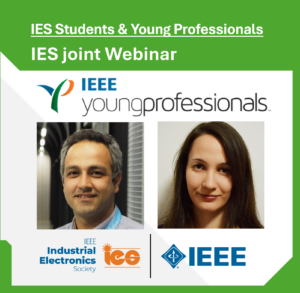[SYP Webinar] Recent Applications of Artificial Intelligence for Power Electronics
Tuesday 22 July 2025 at 2:00 PM CET, 8:00 AM EDT
By Hani Vahedi (Delft University of Technology, Netherlands), Mateja Novak (AAU Energy, Aalborg University, Denmark)
Joint webinar with IES Young Professionals Committee
 Register now using the link below:
Register now using the link below:
https://attendee.gotowebinar.com/register/146772056187406429
Abstract:
This webinar will cover recent advances and applications of Artificial Intelligence for Power Electronics, focusing on AI-based control strategies for power converters. One of the main objectives of power electronics control is to ensure efficient energy conversion and provide a fast response under varying operating conditions. In control design, an optimal trade-off between complexity, performance and implementation feasibility needs to be found. Traditional model-based controllers, such as Model Predictive Control (MPC) and Sliding Mode Control (SMC), achieve precise current regulation but are heavily dependent on system parameters. Therefore, new strategies, such as reinforcement learning (RL) controllers and machine learning tools are becoming attractive solutions for controlling power converters. Reinforcement learning provides a model-free approach capable of handling nonlinearities and uncertainties, and, in this webinar, its advantages will be demonstrated controllers for the 5-level Packed U-Cell (PUC5) grid-connected inverter. The proposed RL-based controller leverages a Proportional-Integral (PI) reward function, streamlining the training process by decoupling voltage balancing from the RL control objective. Instead, voltage balancing is managed via redundant switching states, significantly reducing the action space and training complexity. This study highlights the potential of RL as a robust and adaptive control solution for multilevel inverters, offering a promising alternative to conventional control methods. On the other hand, embedding machine learning as a part of the control, or even replacing some components, could offer many advantages, such as learning from real-time and historical system behavior, handling nonlinearities, reducing the system’s dependence on an exact system model, and even detecting anomalies and responding in real time. This webinar will discuss these opportunities and show some examples of what machine learning algorithms can offer in the design and implementation of control algorithms.
Presenters’ bio:
Prof. Hani Vahedi (Senior Member, IEEE) received his PhD with honors from École de Technologie Superieure (ÉTS), University of Quebec, Montreal, Canada, in 2016. He received the Best PhD Thesis Award from ETS for the academic year of 2016-2017. He has published more than 90 technical papers in IEEE conferences and Transactions. He also published a book on Springer Nature and a book chapter in Elsevier. He was a co-chair of the IEEE Industrial Electronics Society (IES) Student & Young Professionals (S&YP) committee and is currently serving as the IES Chapters Coordinator. He has been co-organizing special sessions and SYP forums at IEEE international conferences. He is also the associate editor for IEEE Transactions on Industrial Electronics, IEEE Open Journal of Industrial Electronics Society, and IEEE Open Journal of Power Electronics. He is the inventor of the PUC5 converter, holds multiple US/world patents, and transferred that technology to the industry, where he developed the first bidirectional electric vehicle DC charger based on his invention. After 7 years of experience in industry as a power electronics designer and chief scientific officer, he joined the Delft University of Technology, where he is currently an assistant professor at the DCE&S group, working towards the electrification of industrial processes for clean energy transition. He is also leading the 24/7 Energy Hub project at The Green Village of TU Delft, implementing a local microgrid with renewable energy resources, green Hydrogen production, and energy storage systems as the future of the clean energy transition. His research interests include multilevel converter topologies, control and modulation techniques, and their applications in the electrification of industrial processes and clean energy transition, such as smart grids, renewable energy conversion, electric vehicle chargers, green hydrogen production (electrolyzers), and fuel-cell systems.
Prof. Mateja Novak received the M.Sc. degree in Electrical Engineering and Information Technology from Zagreb University, Croatia, in 2014 and the Ph.D. degree in Electrical Engineering from Aalborg University, Denmark, in 2020. She is currently working as Assistant Professor at AAU Energy, Aalborg University, Denmark. She was a visiting researcher at the Chair of Power Electronics, Kiel University, Kiel, Germany in 2018 and Danfoss Drives Intelligence, Gråsten, Denmark in 2023. Dr. Novak is the recipient of EPE Outstanding Young EPE Member Award for the year 2019 and 2nd price winner of 2021 IEEE-IES Student and YP Competition. Her research interests include model predictive control, multilevel converters, machine learning, statistical model checking, reliability of power electronic systems and renewable energy systems.

